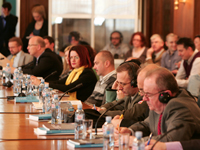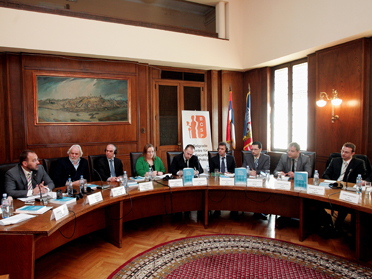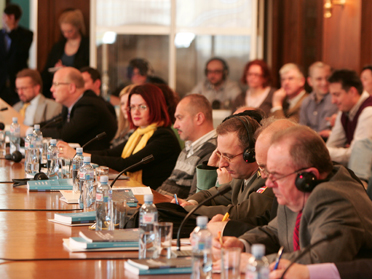Launch of the Almanac on Security Sector Reforms in the Western Balkans

On March 27, Andreja Bogdanovski (Security Research Fellow) together with six other think tank representatives from the Western Balkans promoted the first ever "Almanac on Security Sector Reforms in the Western Balkans" in Belgrade, Serbia.


On March 27, Andreja Bogdanovski (Security Research Fellow) together with six other think tank representatives from the Western Balkans promoted the first ever “Almanac on Security Sector Reforms in the Western Balkans” in Belgrade, Serbia.
Countries from the Western Balkans have come a long way in their efforts to streamline their Security Sector Reforms in order to make them fully aligned with the principles of good governance, transparency and accountability. Still there are remaining issues evident in all the countries from the region. In Serbia for example a question that still hampers the above mentioned principles is the lack of adequate legal framework on private security companies, making their work problematic due to their alignment with political parties that are using them for their own purposes. Politicization also seems to represent a major problem in the security sector governance in Montenegro, especially when it comes to the oversight mechanisms. The main problems regarding the reforms in Kosovo have to do with the fact that Kosovo started building its security system from a scratch and there are still certain non-statutory security actors that might impede the overall process. The same legacy of building the security sector from a scratch follows the reform processes in Bosnia and Herzegovina where also the questions of politicization and weak oversight remain to be addressed. In the case of Macedonia and Albania establishing good track record when it comes to implementation of the laws regulating the security sector is essential. In the Macedonia case there has been an increased attention on the police proceedings (i.e. over – excessive use of force), especially after the murder of a youngster by a Police Officer last summer. Additionally the lack of oversight over the intelligence services, especially over the Directorate for Security and Counterintelligence perturbs the picture of a reformed security sector. Speaking of Croatia’s performance one can note that as part of its commitments to EU and NATO integration Croatia’s security sector reforms are in a rather steady course.
The Almanac represents a joint effort of seven think tanks dealing with security issues across the Western Balkans and represents the final product of the project “Building capacities of the Civil Society Organisations to Map and Monitor the Security Sector Reforms in the Western Balkans” The project has been financially supported by the Norwegian Ministry of Foreign Affairs and has been coordinated by the Geneva Center for the Democratic Control of the Armed Forces (DCAF) and the Belgrade Center for Security Policy (BCSP).
For a free copy of the Almanac on Security Sector Reforms in the Western Balkans please click here. Translated versions in Macedonian and Albanian will follow soon.
For pictures from the event please go to the following link.
